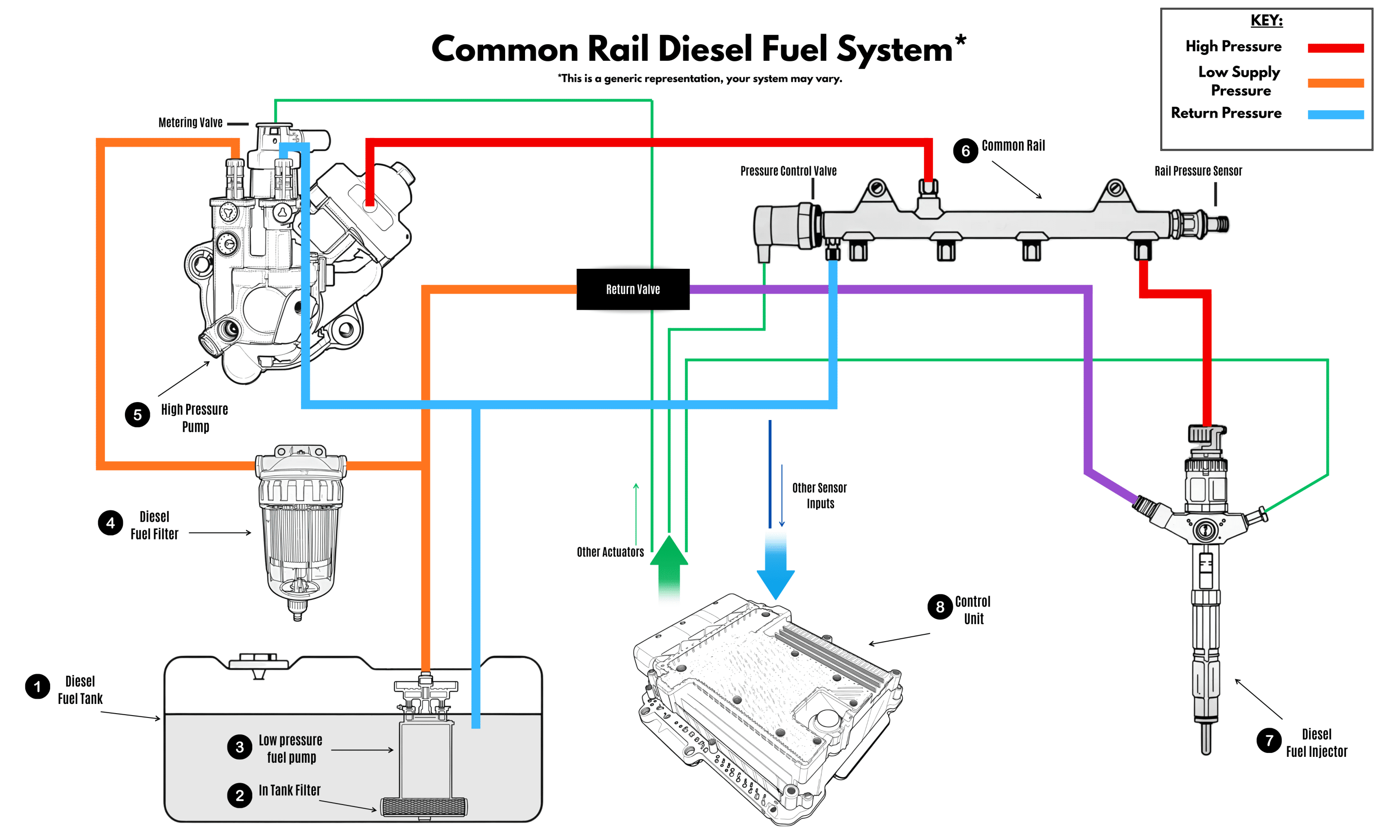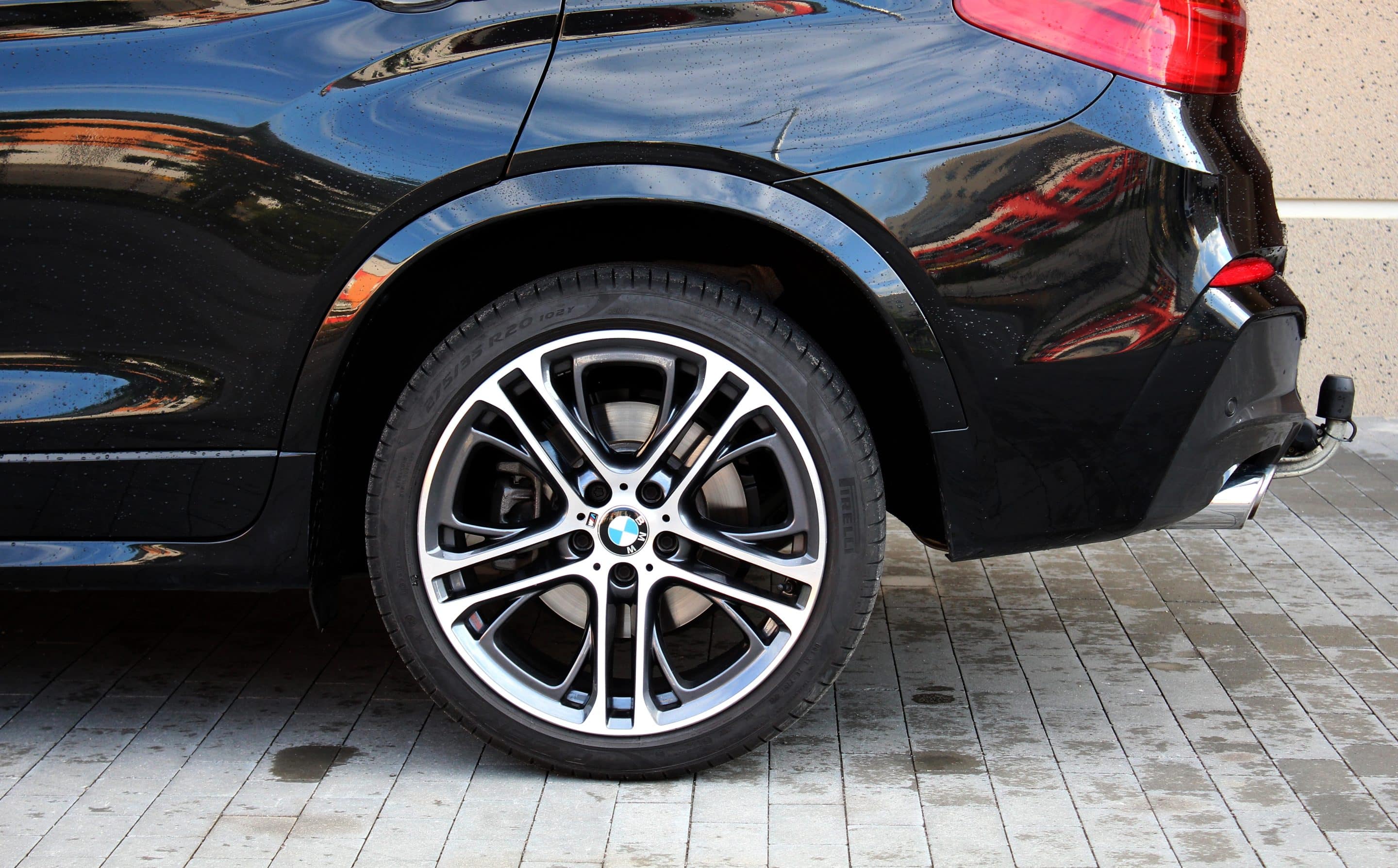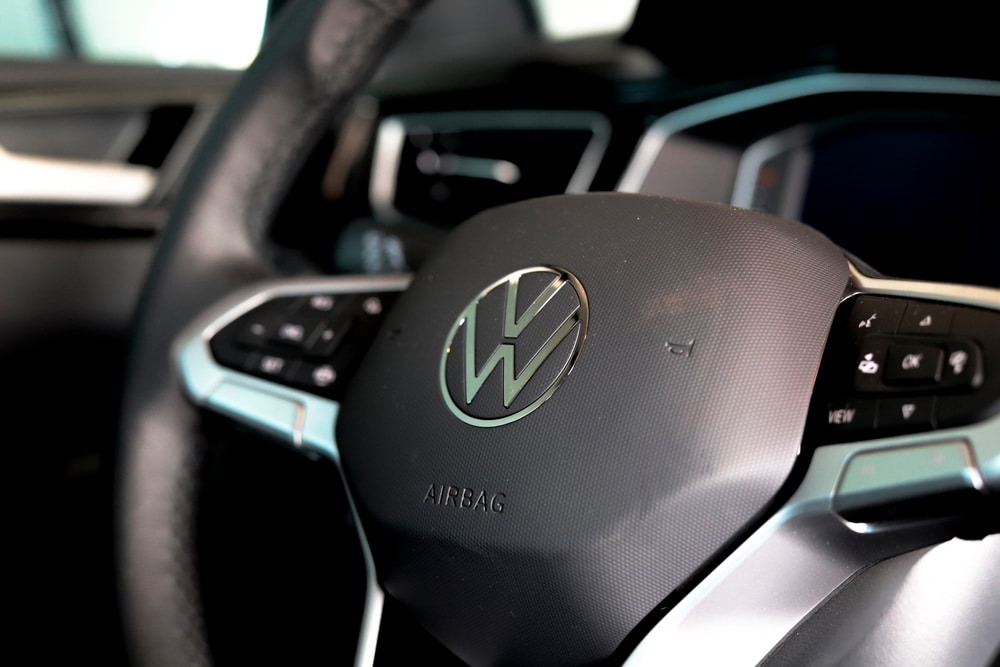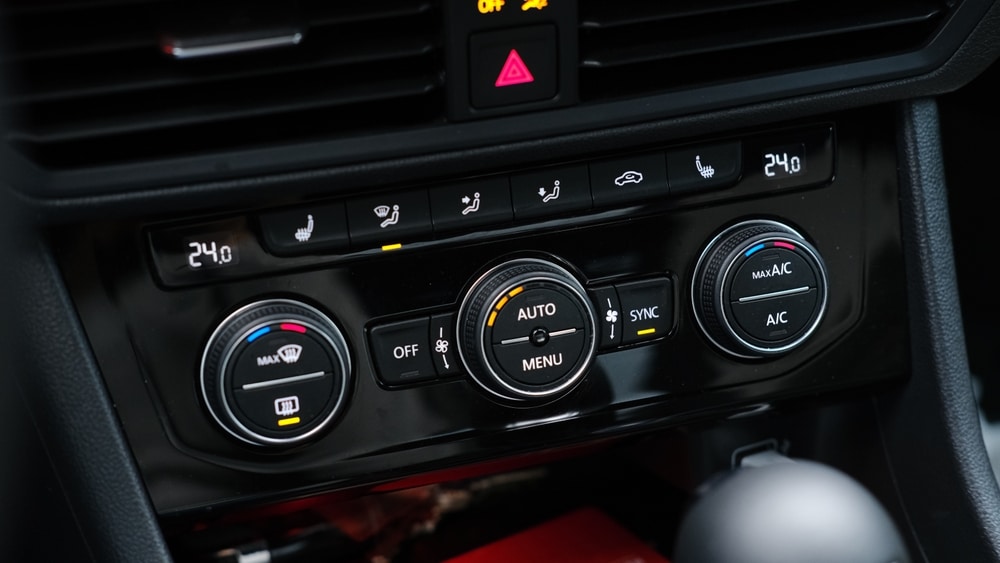How Your Diesel Fuel System Keeps Your Engine Running
A fault with your diesel fuel system isn’t something to take lightly.
This system is responsible for one of your vehicle’s most vital tasks: ensuring fuel reaches the engine. Without it, combustion wouldn’t happen, and your car would simply not move.
Modern diesel fuel systems are highly sophisticated. They deliver precise amounts of fuel at the required pressure, giving today’s diesel vehicles their balance of strength, economy, and dependability.
But there’s a catch.
Because the system works under extreme pressure and with remarkable accuracy, even small issues, such as delaying a fuel filter change or putting petrol in the tank by mistake, can lead to costly damage.
In this guide, we’ll explore how your diesel fuel system operates, what can go wrong if servicing is ignored, and why keeping on top of maintenance can help you avoid repairs that could run into the thousands.
Need support with your diesel vehicle? Book your service with JDK Automotive, Camberley today: call 01276 535585.
Understanding How the Diesel Fuel System Works
Different vehicles can use different fuel delivery setups, but most modern diesels are designed with a common rail diesel fuel system.
Although manufacturers implement it differently, the principle is consistent: a high-pressure rail feeds all the injectors, ensuring a steady fuel supply and flexible control over the injection process.
The common rail diesel fuel system can be divided into two main sections:
- Low-pressure side: The fuel pump delivers diesel from the tank and moves it through the fuel filters before it reaches the high-pressure pump. Its role is to provide a steady, clean flow of fuel at the right supply pressure so the next stage of the system can function without risk of contamination or water damage.
- High-pressure side: Here, the high-pressure pump raises the fuel pressure to extreme levels and delivers it into the common rail, which stores it under constant pressure. From there, diesel injectors release it into the engine cylinders as an ultra-fine mist at exactly the right moment for combustion.
In simple terms, the diesel fuel system ensures that a reliable, pressurised supply of clean fuel enters the cylinders each time the engine runs.
Not sure which system your car uses? The team at JDK Automotive in Camberley, near Farnborough, can confirm this during your next service.
A Closer Look At The Diesel Fuel System
Now that we’ve covered the overall process, let’s break the common rail diesel fuel system into its main components. Each part has a distinct function, and together they allow your engine to run efficiently and dependably (see the illustration below for an example layout of one particular type of common rail diesel system and how the parts connect).
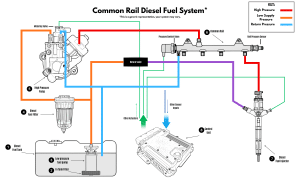
Breaking Down the Low-Pressure Stage of Your Diesel Fuel System
Fuel Tank and Low-Pressure Fuel Pump
The process starts at the fuel tank (part 1 of image). From here, a low-pressure pump (part 3 of image) delivers diesel to the high-pressure pump, providing a consistent feed of fuel.
Diesel Fuel Filter
Before the fuel reaches important components, it passes through dedicated filters (parts 2 and 4 of image). These remove debris and separate out the water that naturally exists in diesel. Without this protection, contaminants can cause serious damage throughout the system.
Exploring the High-Pressure Stage of Your Diesel Fuel System
High-Pressure Fuel Pump (HPFP)
After filtration, diesel enters the high-pressure pump (part 5 of image). This pump increases the fuel pressure to around 1800 bar, preparing it for injection into the engine.
Metering and Pressure Regulation
Two precision valves make sure the pump delivers optimum fuel delivery:
- Fuel metering valve: Regulates how much diesel enters the high-pressure fuel pump chamber, ensuring the optimal amount is delivered for the engine’s demands.
- Pressure control valve: Adjusts the pressure inside the common rail so the engine receives the right amount for every operating condition, whether idling or under load.
Together, these valves ensure the system runs smoothly and consistently.
Diesel Fuel Rail
The rail (part 6 of image) acts as a pressurised chamber. Storing fuel at a stable high pressure allows each injector to draw from the same source, ensuring every cylinder receives a consistent supply. Sensors and control systems constantly monitor this balance to maintain performance.
Diesel Injector Accuracy
Finally, fuel reaches the injectors (part 7 of image). These highly precise components have nozzle holes around the size of a human hair. They atomise fuel into the engine in an ultra-fine mist at precisely the right timing, ensuring efficient combustion and smooth operation.
Why the Diesel Fuel System Stands Out
The diesel fuel system may appear to be just pumps, filters, pipes, and valves, but in reality, it’s a finely tuned piece of engineering. A few features make it especially impressive:
- Extreme pressures and precision: The system combines the low-pressure supply stage with the high-pressure injection stage to deliver the exact quantity of fuel in fractions of a second. It has to cope with fuel being blasted through it at roughly a thousand times the pressure found in your tyres, so it can be atomised for efficient combustion.
- Engineering accuracy: From the low-pressure pump and filters to the high-pressure pump, rail, and injectors, every element works with exceptional accuracy. Together, these parts ensure the right amount of fuel is injected at the right time and pressure, giving smoother operation, stronger efficiency, and more reliable performance.
- Vulnerability to contamination: Because of the precision involved, even tiny amounts of dirt or water can cause damage or corrosion. Replacing diesel fuel filters at the intervals recommended by the manufacturer and filling up with quality diesel are essential steps to protect the system.
When everything is working as it should, the diesel fuel system enables your engine to perform at its best. But if neglected, small issues can quickly become costly repairs.
For peace of mind, book your diesel service with JDK Automotive in Camberley, near Farnborough, on 01276 535585.
The Consequences of Overlooking Diesel Fuel System Care
Because parts of the diesel fuel system work at extreme pressure and with incredible precision, even a small lapse in maintenance can lead to significant problems. Here’s what can happen if servicing is ignored:
- Missing filter replacements: Diesel fuel filters capture dirt and separate the water naturally present in diesel. If filters are not changed on schedule, both dirt and water can circulate through the pumps and injectors, leading to corrosion and accelerated wear across the system.
- Low-grade or contaminated fuel: Cheaper or poor-quality diesel often contains a higher water content and more impurities. This increases the risk of corrosion inside all fuel system components.
- Chain reaction damage: Once corrosion or debris is in the fuel system, it circulates through pumps, rails, and injectors, leading to repeated failures. Replacing individual components doesn’t resolve the problem if the underlying contamination remains.
To put it simply, replacing a diesel fuel filter costs very little compared to the thousands it can take to put right a complete system failure.
Another issue to be aware of is misfuelling. Putting petrol into a diesel tank is surprisingly common but extremely damaging. Petrol doesn’t provide the lubrication diesel does. Even starting the engine for a fraction of a second can send petrol through the pump, rail, and injectors, causing serious harm to these components.
If misfuelling occurs, the safest approach is not to start the vehicle and to have the misfuelling rectified by a professional immediately.
How to Protect Your Diesel Fuel System
Your diesel fuel system is both powerful and precise. When it’s properly maintained, it works continuously in the background, keeping your engine smooth, efficient, and dependable. But if neglected or misfuelled, breakdowns can occur suddenly and often lead to costly repairs.
The good news is that you can help protect your vehicle by following a few straightforward steps:
- Follow the manufacturer’s recommended service intervals.
- Replace diesel fuel filters when scheduled.
- Use high-quality diesel to avoid added water and impurities.
Keeping up with these simple measures is far cheaper and easier than dealing with more severe problems.
When it comes to maintenance, choosing the right garage makes all the difference. That’s why so many diesel vehicle owners rely on JDK Automotive in Camberley, serving nearby Farnborough too.
Call us today on 01276 535585 to arrange your diesel service.
Why Motorists in Camberley and Farnborough Trust JDK Automotive
When it comes to keeping your diesel fuel system in peak condition, the garage you choose really matters. Here’s why local drivers turn to us:
- Experienced technicians: Our team has extensive knowledge of modern diesel systems, including common rail technology, pumps, filters, and injectors.
- Quality parts and service: Every repair and replacement is backed by a 12-month parts and labour guarantee, giving you confidence in the work carried out.
- Local convenience: Based in Camberley, Surrey and serving motorists from Farnborough and across the county, we’re your trusted independent alternative to the main dealer.
We’re proud of the reputation we’ve built. With an average Google rating of {{average-rating}}⭐ from {{review-count}} drivers in Camberley, you can book your diesel service knowing you’re in safe hands.
Keep your diesel fuel system performing at its best; call us today on 01276 535585 to secure your service appointment.
Diesel Fuel System FAQs
1. How does a diesel fuel system work?
Although there are different designs, most modern diesel vehicles rely on a common rail system. Fuel is delivered at low pressure from the tank, passed through pumps and filters, then highly pressurised by the high-pressure pump. It’s stored in the fuel rail before being injected into the cylinders for combustion.
2. What is meant by a common rail diesel fuel system?
A common rail diesel fuel system works in two stages. First, fuel is delivered from the tank at low pressure, passing through pumps and filters before reaching the high-pressure pump.
This pump then raises the pressure and directs the fuel into the rail, which acts as a high-pressure reservoir. From there, the injectors release precise amounts of fuel into the cylinders at the right moment for combustion.
This design ensures a stable fuel supply, cleaner burning, and smoother overall performance.
3. Why is regular diesel fuel system servicing important?
Routine servicing helps protect pumps, filters, and injectors from dirt, water, and wear. Replacing diesel fuel filters at the intervals recommended by the manufacturer reduces the chance of breakdowns, keeps the engine reliable, and avoids expensive damage to critical components.
4. What usually causes diesel fuel system damage?
Skipping filter changes, running on poor-quality fuel or misfuelling with petrol can all lead to major failures. Even tiny amounts of debris can spread through the entire system, affecting multiple components.
5. What happens if petrol is put into a diesel tank?
Petrol doesn’t lubricate the way diesel does. Even starting the engine for a fraction of a second can circulate petrol through the rail and injectors, creating the risk of severe damage. The safest action is not to start the car.
If misfuelling occurs, the safest response is not to start the engine and to call a professional straight away. They will drain the tank and inspect the system to minimise the chance of long-term damage.
6. How much does repairing a diesel fuel system cost?
The cost depends on your vehicle and the level of damage. A scheduled fuel filter change is an inexpensive preventative step (compared to repairing the system), but ignoring it can lead to much larger repair bills. Once high-pressure pumps or injectors are involved, the repair becomes significantly more complex and costly.
Still have questions about your diesel vehicle’s fuel system?
Speak with the experts at JDK Automotive in Camberley, near Farnborough. Call 01276 535585 for advice or to book your service.
Call Now 01276 535585Save on Servicing
